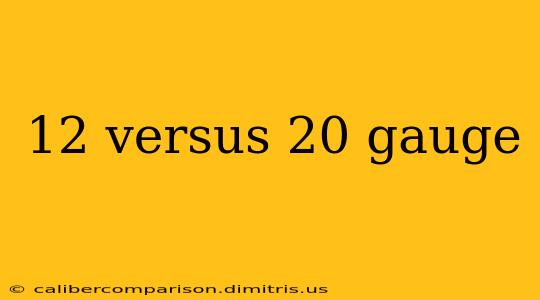Choosing between a 12-gauge and a 20-gauge shotgun is a common dilemma for both novice and experienced shooters. The decision hinges on several factors, including intended use, physical capabilities, and personal preferences. This comprehensive guide will delve into the key differences between these popular gauges to help you make an informed choice.
Gauge Explained: Understanding the Numbers
Before diving into the comparison, it's crucial to understand what "gauge" signifies. The gauge of a shotgun refers to the number of lead balls, each with a diameter equal to the inside diameter of the barrel, that would weigh one pound. Therefore, a 12-gauge shotgun means that twelve lead balls of the barrel's diameter would weigh one pound. A 20-gauge shotgun, conversely, means twenty such balls would weigh one pound. This system dictates the bore size and, consequently, the shell size and power.
12 Gauge: The Workhorse
The 12 gauge is arguably the most popular shotgun gauge worldwide. Its dominance stems from its versatility and power.
Advantages of 12 Gauge:
- Power: The larger bore diameter translates to significantly more power and stopping power, making it ideal for hunting larger game like deer, turkey, and waterfowl at longer ranges.
- Versatility: 12-gauge shotguns are available in a vast array of configurations, from hunting shotguns to tactical shotguns, catering to various shooting disciplines.
- Ammunition Availability: Finding 12-gauge ammunition is incredibly easy, regardless of your location or the type of shot you need.
- Recoil Management: While recoil is noticeable, advancements in technology have produced 12-gauge shotguns with recoil-reducing features, making them manageable even for smaller-statured shooters.
Disadvantages of 12 Gauge:
- Recoil: The substantial power generates considerable recoil, which can be uncomfortable or even painful for some shooters, especially beginners.
- Weight: 12-gauge shotguns tend to be heavier than their 20-gauge counterparts, leading to fatigue during extended shooting sessions.
- Size and Bulk: The larger size and bulk can be cumbersome for smaller individuals or those with limited physical strength.
20 Gauge: The Lightweight Champion
The 20 gauge offers a compelling alternative for those seeking a lighter, more manageable shotgun without sacrificing too much power.
Advantages of 20 Gauge:
- Reduced Recoil: The lower power results in significantly less recoil, making it more comfortable to shoot, particularly for beginners or those with limited upper body strength.
- Lighter Weight: 20-gauge shotguns are generally lighter than 12-gauge shotguns, enhancing maneuverability and reducing fatigue.
- Reduced Noise: The lower power often translates into less noise, which can be beneficial for hunters who prefer a quieter shooting experience.
- Excellent for Smaller Shooters: The lighter weight and reduced recoil make it particularly suitable for women and younger shooters.
Disadvantages of 20 Gauge:
- Less Power: The reduced power limits its effectiveness against larger game at longer ranges compared to a 12-gauge. For hunting larger game at longer distances, a 12-gauge might be more suitable.
- Ammunition Variety: While widely available, the selection of 20-gauge ammunition is generally less extensive than that of 12-gauge.
Choosing the Right Gauge: A Summary
The best gauge for you depends on your individual needs and shooting style.
-
Choose a 12-gauge if: You need maximum power and versatility, are hunting larger game, or prioritize ammunition availability. Be prepared to manage stronger recoil.
-
Choose a 20-gauge if: You prioritize reduced recoil and lighter weight, are a smaller-statured shooter, or are focused on smaller game hunting at closer ranges. Understand that you might sacrifice some power and ammunition variety.
Ultimately, the best way to make an informed decision is to handle both 12-gauge and 20-gauge shotguns and test fire them if possible. This will allow you to experience the differences in recoil, weight, and overall feel firsthand. Consider consulting with experienced shooters or firearm professionals for personalized guidance.

